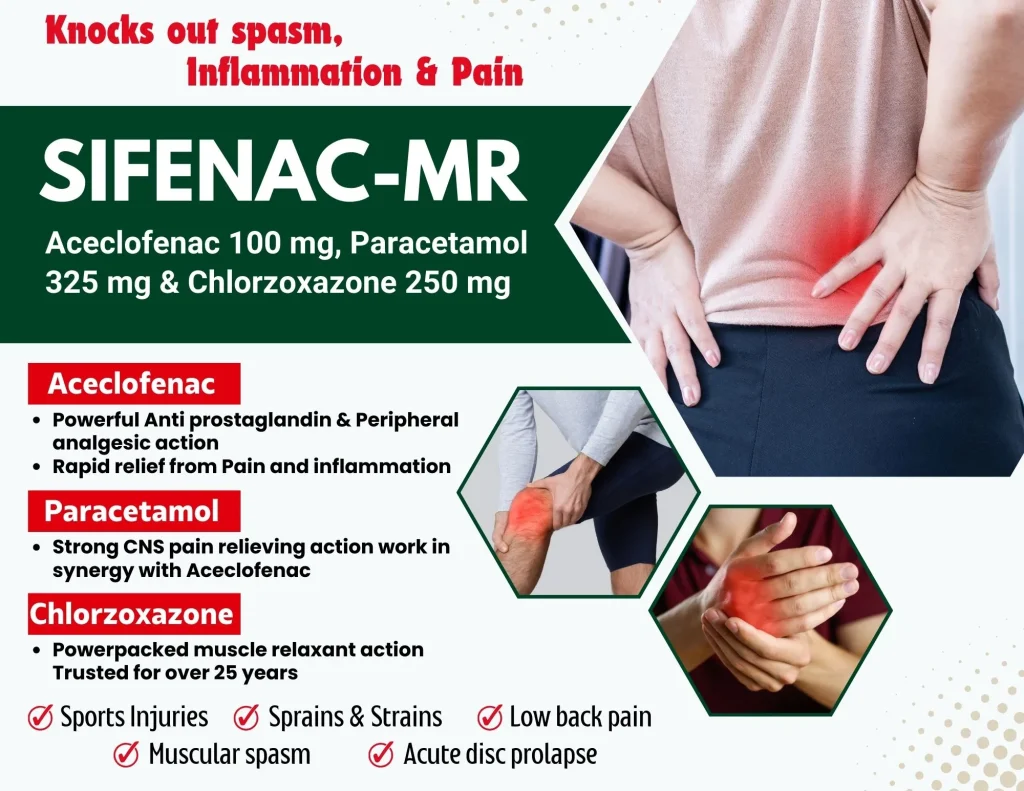- For PCD: +91 84274 44669, For API: +91 9888000708
- For PCD: pankaj@signaindia.com, For API: atul@signaindia.com
- E 56, Industrial Area, Phase 8, Mohali, Punjab, India
Generic Name: Aceclofenac + Paracetamol + Chlorzoxazone
Brand Name: Sifenac-MR
Composition: Aceclofenac 100 Mg, Paracetamol 325 Mg & Chlorzoxazone 250 Mg
Pack: 10X10, ALU/ALU
Aceclofenac 100 mg, Paracetamol 325 mg & Chlorzoxazone 250 mg is a combination medication used to relieve pain and inflammation associated with musculoskeletal conditions. This comprehensive guide provides insights into its uses, potential side effects, precautions, interactions, and measures in case of an overdose.

Aceclofenac 100 mg, Paracetamol 325 mg & Chlorzoxazone 250 mg is indicated for the treatment of mild to moderate pain, inflammation, and muscle spasms associated with conditions such as arthritis, sprains, strains, and muscle injuries.
Common side effects associated with Aceclofenac 100 mg, Paracetamol 325 mg & Chlorzoxazone 250 mg may include nausea, stomach upset, dizziness, drowsiness, and allergic reactions such as skin rash or itching. In rare cases, more serious side effects such as liver or kidney problems may occur. Seek medical attention if any adverse reactions occur.
Before using Aceclofenac 100 mg, Paracetamol 325 mg & Chlorzoxazone 250 mg, inform your healthcare provider about any allergies, medical conditions, or medications you are currently taking. Use caution in patients with a history of liver or kidney problems, gastrointestinal ulcers, or asthma. Avoid alcohol consumption while taking this medication, as it may increase the risk of side effects.
Interactions:
It may interact with certain medications, including blood thinners, other pain relievers, and medications that affect liver function. To avoid potential interactions, inform your healthcare provider or pharmacist about all medications you are currently taking.
Overdose:
Taking more than the recommended dosage of this combination can lead to overdose, which may cause symptoms such as nausea, vomiting, stomach pain, dizziness, drowsiness, and difficulty breathing. In case of an overdose, seek immediate medical attention.
Conclusion:
This combination medication used to relieve pain and inflammation associated with musculoskeletal conditions. While generally safe and effective when used as directed, it’s important to be aware of potential side effects, precautions, interactions, and the risk of overdose. Always follow the recommended dosage instructions and consult your healthcare provider if you have any questions or concerns.